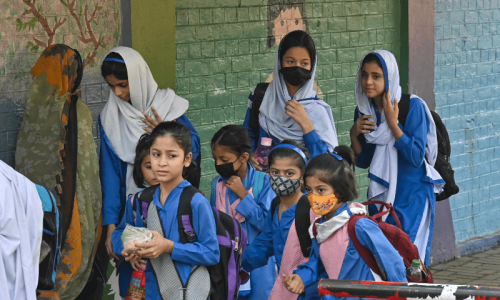Nearly half of Pakistan’s school-age children—approximately 26 million—are out of school until at least mid-November due to severe air pollution, according to Save the Children. This marks the second instance this year that schools have been closed to safeguard children’s health.
Authorities have ordered all schools in Punjab to close as air pollution levels have reached unprecedented highs, with Lahore recording the world’s highest pollution levels on Thursday.
Swiss air quality monitoring group IQAir has labeled Lahore’s air quality as ‘hazardous,’ with PM 2.5 concentrations exceeding the World Health Organization’s safe limits by over 100 times.
Earlier in May, a severe heatwave forced the closure of primary and secondary schools, prompting Save the Children in Pakistan to launch a social media campaign to inform children and their families on precautions during extreme heat.
Education Minister Highlights Balochistan’s Challenges
Education Minister Raheela Hameed Khan Durrani revealed that more than 39% of children in Balochistan have never attended school. Speaking at a scholarship ceremony for the Wasila Programme, she described the high rate of absenteeism as a “tragedy” and underscored the government’s duty to ensure children receive their fundamental right to education. Ms. Durrani called on assembly members to adopt local schools and transform them into model institutions.
Ms. Durrani also discussed the scholarship initiative launched by Islamic Relief Pakistan, which provides essential support for students in the province.
Protective Measures in Lahore
This week, with air quality indices reaching record levels, Lahore authorities directed primary schools to close for a week to protect children from respiratory problems. The city of 11 million has been shrouded in thick haze for most of the week. Last year, Lahore ranked as the fifth most polluted city globally, with crop burning, low-quality vehicle fuel, and construction identified as significant contributors to Pakistan’s persistent air pollution crisis.
The provincial government has mandated mask-wearing in public places and advised offices to implement a work-from-home policy for half of their staff. Additionally, all government meetings have been moved online until further notice.
“Air pollution and rising temperatures pose life-threatening risks to children, including breathing difficulties and a higher likelihood of infectious diseases. As we’re seeing in Pakistan, it also disrupts education,” said Khuram Gondal, Save the Children’s Country Director. “While the government has taken steps to mitigate this issue, we urge policymakers to adopt long-term strategies to tackle air pollution and create a healthier future for children,” he added.




